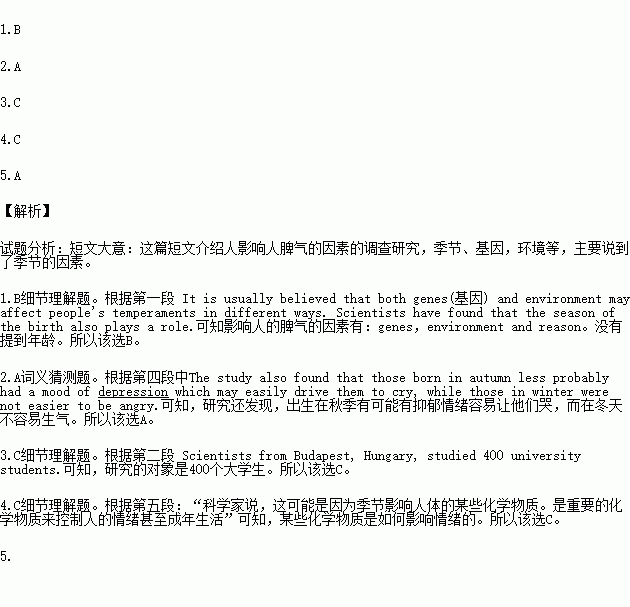题目内容
Are you happy most of the time? Or do you easily get angry sometimes? Everyone has a different temperament(脾气) . It is usually believed that both genes(基因) and environment may affect people's temperaments in different ways. Scientists have found that the season of the birth also plays a role.
Scientists from Budapest, Hungary, studied 400 university students. In the study, the students need to finish a questionnaire (问卷) The purpose of it was to find out which of four kinds of temperaments they most had. From the questionnaire, scientists found that the students always answered something like “My mood often changes for no reason.” and “I love to deal with new projects, even if it is risky.” These answers were then matched with their birthdays.
They discovered that people born in summer easily change between sad and happy moods compared to people born in winter. Those who always feel positive are mostly born in spring and summer.
The study also found that those born in autumn less probably had a mood of depression which may easily drive them to cry, while those in winter were not easier to be angry.
Scientists said that this was probably because the seasons had an influence on certain chemicals in the human body. And the chemicals are important to control people’s moods even in adult life.
“It seems that when you are born may increase or decrease your chance of developing certain mood disorders(紊乱) ,” lead scientist Xenia Gonda told the Telegraph.
1.What probably can’t affect people’s temperaments according to Paragraph 1?
A. Genes. B. Ages. C. Seasons. D. Environment.
2.What does the underlined word “depression” most probably mean?
A. Sadness. B. Happiness.
C. Surprise. D. Excitement.
3.Which of the following sentences is NOT true from the passage?
A. People born in summer change their moods more easily.
B. The season of birth has an influence on human’s moods.
C. There were 400 middle school students taking part in the study.
D. The answers to the questionnaire were matched with their birthdays.
4.What will the writer most probably write about on “______”?
A.How many kinds of moods there are.
B. What can we change the human body most.
C. How the certain chemicals affect the moods.
D. Whether the students will continue their study.
5.What’s the best title of this passage?
A. Seasons and Moods. B. The influence of Genes.
C. Moods and Health. D. The Importance of Birthplaces.
 阅读快车系列答案
阅读快车系列答案任务型阅读 阅读下面的短文,根据短文内容完成下面表格。
Celebrating New Year’s Day is one of the oldest and most exciting traditions around the world. Since this festival marks the beginning of the year, New Year’s Day is thought of as a perfect time for a “clean start”. People in the world decide to act better in the year just beginning than the year just ended.
No day has ever been celebrated in so many different ways. All over the world, countries have their own special beliefs about what the New Year means to them.
In Scotland, the New Year is called Hogmanay. In the villages of Scotland, barrels of tar (沥青) are set on fire. It represents that the old year is burned up and the new one is allowed to enter.
New Year’s Day is also the Festival of Saint Basil in Canada. Children leave their shoes by the fireside on New Year’s Day with the hope that Saint Basil, who is famous for his kindness, will come and fill their shoes with gifts.
The Jewish New Year is called Rosh Hashanah. It is an important time when Jews promise to do better in the future. Special services are held in the church, children are given new clothes and New Year bread is cooked to remind people of harvest time.
On New Year’s Day in Japan, everyone gets dressed in their new clothes and homes are decorated (装饰) with bamboos—symbols of long life.
In European countries such as Germany, France and Belgium, families start the New Year by first attending church services. Afterwards, they visit friends and relatives. In France, boys and girls receive gifts of money on New Year’s Day.
New Year celebrations around the1.
Country/people | Celebration activities | Special beliefs |
|
| The old year is burned up and the new one is allowed to enter. |
| Children leave their3.by the fireside. | Their shoes will be4.with gifts by Saint Basil. |
| It is a time for people to5.to do better in the future. |
|
| People7.their new clothes. | Symbols of8.life |
European9. | People attend church services10. |
|

